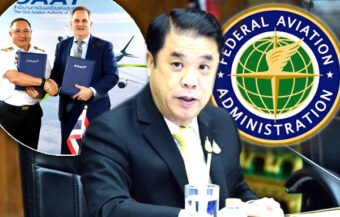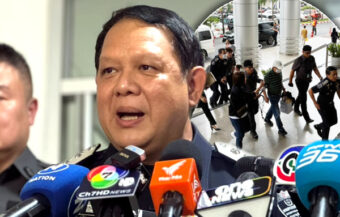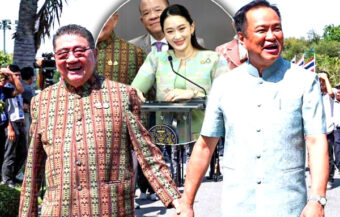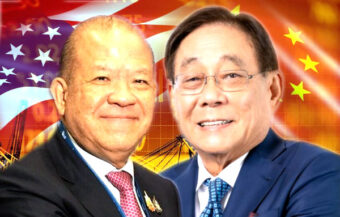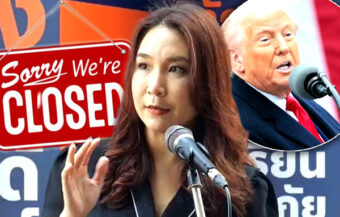Thailand slashes rates and boosts debt to face tariff crisis as bond inflows surge, baht strengthens, and government weighs pivot from China to the US amid warnings from IMF over rising debt and urgent need for new industrial and trade policies.
Thailand is preparing for the Donald Trump tariff crisis just as it did during the pandemic era, with plans to increase public sector debt to cushion the economy. Meanwhile, the kingdom has become a haven for investment money seeking better short-term returns. Again, just as it happened during the pandemic. The Bank of Thailand is expected to lower rates on Wednesday to 1.75%. All analysts believe it will later go further, with one predicting a 1% base rate by the end of the year. However, at the core of this economic challenge is a decision: the United States or China. Certainly, it may be time for Thailand to face up to the elephant in the room. Its economic relationship with China may not be as healthy as it looks. Indeed, as former Premier Thaksin Shinawatra said last Thursday, the US tariff regime is a ‘wake-up’ call for the kingdom on its industrial policy going back decades.
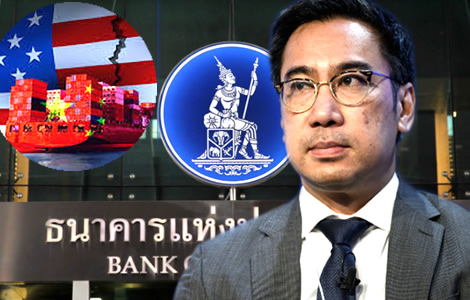
On Wednesday, the Bank of Thailand is expected to reduce its benchmark rate to 1.75%. The 25 basis points reduction comes in light of rising economic headwinds.
Indeed, both Kasikorn Research Centre and Siam Commercial Bank’s Economic Intelligence Centre (EIC) notes predicted this in recent days.
Thailand’s economy is facing a sudden fall in exports in the second half. Meanwhile, the kingdom’s foreign tourism numbers have also begun to decline.
Thailand sees tourism and exports falter as economic headwinds intensify following security incidents
This is particularly due to a reduction in visitors from both China and South Korea, driven by security incidents in the kingdom. Analysts further point to the March earthquake and stalling domestic momentum. All of this is being compounded by the external challenge now hitting the Thai economy.
Certainly, the kingdom’s government, right now appears undecided about how to respond to the Trump tariff challenge. On one hand, it is being forced by the United States to confront Chinese infiltration in its manufacturing economy.
On the other hand, it is nervous of a negative reaction from Beijing. Indeed, China’s Ministry of Commerce warned of retaliatory measures last Monday.
The scale of the challenge is vast. For instance, the Economic Intelligence Centre at Siam Commercial Bank expects the regulator to cut rates three times this year, reaching 1.25% by year-end, if pressures persist.
Thaksin and Paetongtarn Shinawatra call for reassessment of Thai industrial policy with China
This has led to Prime Minister Paetongtarn Shinawatra making statements indicative of the country’s risk with China. Later, her father Thaksin Shinawatra called for a reassessment of Thai industrial policy. Separately, CIMB Thai Bank forecasts that the central bank could slash rates even lower, to 1%, should the economy deteriorate further.
Certainly, the kingdom is being forced to make a decision. Ironically, a decision to align with the United States and protect the domestic economy may usher in much-needed structural reform in the economy.
At length, it is quite clear that Thailand has suffered since the Regional Comprehensive Economic Partnership (RCEP) came into force. In short, this allows China tariff-free access to Thailand, affecting Thailand’s manufacturing sector negatively.
Of course, this would mean facing up to over a decade of misguided policy. That policy has meant courting China and its export-oriented economy. In short, the deciding factor in Thailand will be how the United States administration manages to impose its new order. If successful, Thailand may have no other choice.
Thailand plans stimulus and higher debt ceiling as IMF warns of rising global public debt risks
In the meantime, Thailand’s government appears to be panicking to find its way out of this crisis. This is despite a warning from the International Monetary Fund (IMF) during its meeting in New York last week.
The IMF’s global fiscal outlook was just released during the Spring Meetings. It flagged rising global public debt and urged countries to act decisively.
Back in Thailand, Minister of Finance Pichai Chunhavajira has already signed a ฿500 billion stimulus package. In brief, this would boost consumer spending and support export firms. Thailand’s public debt is currently at 64.4%. The stimulus aims to target consumer demand, encourage domestic investment and offer soft loans to sectors under stress.
The government is thought to be preparing to raise the debt ceiling. This is currently set at 70%. Notably, it was increased by General Prayut Chan-Ocha’s government during the pandemic from 60%. Now the government may raise it further to 80% to comply with the State Fiscal and Financial Disciplines Act 2018.
Finance ministry sources suggest discussions with the National Economic and Social Development Council and the Bank of Thailand are ongoing over funding strategies.
IMF urges Thailand to pursue careful fiscal policy as debt levels exceed ASEAN regional average
Era Dabla-Norris, Deputy Director of the IMF’s Fiscal Affairs Department, responded to a question from Krungthep Turakij newspaper last week.
It was about the public debt situation in ASEAN and Thailand. She noted that fiscal conditions varied significantly across ASEAN countries. Certainly, the region generally maintains a lower debt-to-GDP ratio than other emerging markets.
However, Thailand’s public debt stands at over 60% of GDP, slightly higher than its ASEAN peers. Therefore, the IMF advises the Thai government to implement careful and efficient fiscal policies.
“On average, ASEAN countries have lower debt-to-GDP ratios than other emerging and developing economies. But in Thailand, the debt level is somewhat higher than the ASEAN average, exceeding 60% of GDP,” said Dabla-Norris.
The IMF also warned that global public debt could approach 100% of GDP within the decade if countries fail to control spending.
Finance minister defends higher borrowing as IMF warns Thailand’s economy remains dangerously exposed
Undoubtedly, further raising the debt ceiling will face opposition. Certainly, last week Era Dabla-Norris, Deputy Director of the IMF’s Fiscal Affairs Department, warned against such a course. Indeed, she already sees Thai public sector debt as too high, in contrast to other ASEAN countries.
“On average, ASEAN countries have lower debt-to-GDP ratios than other emerging and developing economies. But in Thailand, the debt level is somewhat higher than the ASEAN average, exceeding 60% of GDP,” she said.
Nevertheless, Minister of Finance Pichai Chunhavajira was confident this week that such borrowing was both necessary and appropriate. He compared Thailand to developed economies where GDP is largely in excess of 100%.
“Many countries carry high debt, but what matters is how the money is used. If it stimulates enough economic growth, the debt-to-GDP ratio will decrease,” Mr. Pichai outlined.
Of course, this is what was also said during the pandemic. During that period, the government’s borrowing efforts insulated the Thai economy from reality to such an extent that many sectors and the overall economy never fully recovered. This is particularly so with the foreign tourism sector.
IMF warns Thailand to shift focus to build a competitive economy as China relationship weakens sectors
Mauricio Soto of the IMF last week stated what successful economies must do. He cautioned that effective fiscal policy now must build competitive, resilient economies with smarter taxation and long-term investment. This is plainly not Thailand’s short-term agenda.
In short, it could be time for Thailand to closely examine its economic relationship with China. A new tariff-induced policy might tie the kingdom closer to the United States. In turn, this would shift Thailand away from the orbit of Beijing and its vast export concerns.
Undoubtedly these are gradually hollowing out the value of Thailand’s economy. For example, Thailand’s steel sector has seen Chinese government-funded firms produce substandard steel and lower prices. Similarly, in the automotive sector, where the Chinese EV car industry has disrupted and damaged the valuable Japanese-created traditional automotive sector.
Certainly, this also includes foreign tourism, which has seen its reputation damaged by cheap Chinese zero-dollar tours and criminality.
On Thursday, former Premier Thaksin Shinawatra told the American Chamber of Commerce and other US leaders that the new US tariff regime was a wake-up call for Thailand.
Thai bond markets see the largest inflows since the pandemic as baht strengthens with rising gold exports
Notably, since the tariff crisis erupted globally, Thailand has seen a similar trend financially to the pandemic crisis. In short, in April there has been an inflow into Thai bond markets, especially into short-term Thai government bonds.
The net inflows in April alone are over $2 billion. According to the Thai Bond Market Association, this marks the biggest monthly inflow since February 2022. It is significantly the highest since 2022 or the pre-pandemic era.
At the same time, the baht has risen by 2%. Here we see another strong trend. The baht is presently being seen as a reserve currency. This is linked to Thailand’s strong external financial position, in particular its gold holdings.
Thai baht seen as new safe-haven currency as gold exports surge and bond yields hit pandemic-era lows
After that, the country is a major exporter of the commodity. Thailand’s gold exports surged by 270% last month compared to a year earlier, boosting its external resilience.
“The correlation between Thailand bonds and US Treasuries has gradually diminished, reducing exposure to volatility spillovers,” explains Edward Ng. Mr Ng is a fund manager at Nikko Asset Management Group. “The remarkable performance of gold has also increased the Thai baht’s appeal to investors.”
Thaksin announces a change in trade and industrial policy. Sounded much like a pivot towards the United States
China warns Thailand not to ‘please’ the United States at its expense. US trade talks again postponed
Undeniably, the baht’s movement is increasingly tracking gold prices, a sign investors are linking it to safe-haven assets. Meanwhile, bond demand has pushed short-term yields to their lowest since 2022, reflecting strong market confidence.
Strategists at Nomura Holdings warn that longer-term Thai bonds remain exposed if government borrowing ramps up aggressively. Nonetheless, short-duration notes continue to draw investor inflows, betting on more rate cuts and a resilient baht.
Join the Thai News forum, follow Thai Examiner on Facebook here
Receive all our stories as they come out on Telegram here
Follow Thai Examiner here
Further reading:
Thaksin does not rule out joining talks in US as Thai team finalises plans. They fly out on Thursday
Trump’s remaking of World trade, if it works, will force Thailand to decide between the US and China
US offers a 90-day tariff pause but Thailand must move faster as it already faces shaved GDP in 2025
PM addresses the nation in shock over last week’s earthquake and this week’s Trump tariff bombshell



